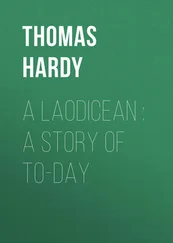Thomas Hardy - A Laodicean
Здесь есть возможность читать онлайн «Thomas Hardy - A Laodicean» — ознакомительный отрывок электронной книги совершенно бесплатно, а после прочтения отрывка купить полную версию. В некоторых случаях можно слушать аудио, скачать через торрент в формате fb2 и присутствует краткое содержание. Жанр: unrecognised, на английском языке. Описание произведения, (предисловие) а так же отзывы посетителей доступны на портале библиотеки ЛибКат.
- Название:A Laodicean
- Автор:
- Жанр:
- Год:неизвестен
- ISBN:нет данных
- Рейтинг книги:3 / 5. Голосов: 1
-
Избранное:Добавить в избранное
- Отзывы:
-
Ваша оценка:
- 60
- 1
- 2
- 3
- 4
- 5
A Laodicean: краткое содержание, описание и аннотация
Предлагаем к чтению аннотацию, описание, краткое содержание или предисловие (зависит от того, что написал сам автор книги «A Laodicean»). Если вы не нашли необходимую информацию о книге — напишите в комментариях, мы постараемся отыскать её.
A Laodicean — читать онлайн ознакомительный отрывок
Ниже представлен текст книги, разбитый по страницам. Система сохранения места последней прочитанной страницы, позволяет с удобством читать онлайн бесплатно книгу «A Laodicean», без необходимости каждый раз заново искать на чём Вы остановились. Поставьте закладку, и сможете в любой момент перейти на страницу, на которой закончили чтение.
Интервал:
Закладка:
A latent power in the man, or boy, was revealed by the circumstance that Somerset did not feel, as he would ordinarily have done, that it was a matter of profound indifference to him whether this gentleman-photographer were a likeable person or no.
'I have called by appointment; or rather, I left a card stating that to-day would suit me, and no objection was made.' Somerset recognized the voice; it was that of the invisible stranger who had talked with the landlord about the De Stancys. Mr. Dare then proceeded to explain his business.
Somerset found from his inquiries that the man had unquestionably been instructed by somebody to take the views he spoke of; and concluded that Dare's curiosity at the inn was, after all, naturally explained by his errand to this place. Blaming himself for a too hasty condemnation of the stranger, who though visually a little too assured was civil enough verbally, Somerset proceeded with the young photographer to sundry corners of the outer ward, and thence across the moat to the field, suggesting advantageous points of view. The office, being a shadow of his own pursuits, was not uncongenial to Somerset, and he forgot other things in attending to it.
'Now in our country we should stand further back than this, and so get a more comprehensive coup d'oeil,' said Dare, as Somerset selected a good situation.
'You are not an Englishman, then,' said Somerset.
'I have lived mostly in India, Malta, Gibraltar, the Ionian Islands, and Canada. I there invented a new photographic process, which I am bent upon making famous. Yet I am but a dilettante, and do not follow this art at the base dictation of what men call necessity.'
'O indeed,' Somerset replied.
As soon as this business was disposed of, and Mr. Dare had brought up his van and assistant to begin operations, Somerset returned to the castle entrance. While under the archway a man with a professional look drove up in a dog-cart and inquired if Miss Power were at home to-day.
'She has not yet returned, Mr. Havill,' was the reply.
Somerset, who had hoped to hear an affirmative by this time, thought that Miss Power was bent on disappointing him in the flesh, notwithstanding the interest she expressed in him by telegraph; and as it was now drawing towards the end of the afternoon, he walked off in the direction of his inn.
There were two or three ways to that spot, but the pleasantest was by passing through a rambling shrubbery, between whose bushes trickled a broad shallow brook, occasionally intercepted in its course by a transverse chain of old stones, evidently from the castle walls, which formed a miniature waterfall. The walk lay along the river-brink. Soon Somerset saw before him a circular summer-house formed of short sticks nailed to ornamental patterns. Outside the structure, and immediately in the path, stood a man with a book in his hand; and it was presently apparent that this gentleman was holding a conversation with some person inside the pavilion, but the back of the building being towards Somerset, the second individual could not be seen.
The speaker at one moment glanced into the interior, and at another at the advancing form of the architect, whom, though distinctly enough beheld, the other scarcely appeared to heed in the absorbing interest of his own discourse. Somerset became aware that it was the Baptist minister, whose rhetoric he had heard in the chapel yonder.
'Now,' continued the Baptist minister, 'will you express to me any reason or objection whatever which induces you to withdraw from our communion? It was that of your father, and of his father before him. Any difficulty you may have met with I will honestly try to remove; for I need hardly say that in losing you we lose one of the most valued members of the Baptist church in this district. I speak with all the respect due to your position, when I ask you to realize how irreparable is the injury you inflict upon the cause here by this lukewarm backwardness.'
'I don't withdraw,' said a woman's low voice within.
'What do you do?'
'I decline to attend for the present.'
'And you can give no reason for this?'
There was no reply.
'Or for your refusal to proceed with the baptism?'
'I have been christened.'
'My dear young lady, it is well known that your christening was the work of your aunt, who did it unknown to your parents when she had you in her power, out of pure obstinacy to a church with which she was not in sympathy, taking you surreptitiously, and indefensibly, to the font of the Establishment; so that the rite meant and could mean nothing at all.... But I fear that your new position has brought you into contact with the Paedobaptists, that they have disturbed your old principles, and so induced you to believe in the validity of that trumpery ceremony!'
'It seems sufficient.'
'I will demolish the basis of that seeming in three minutes, give me but that time as a listener.'
'I have no objection.'
'Very well.... First, then, I will assume that those who have influenced you in the matter have not been able to make any impression upon one so well grounded as yourself in our distinctive doctrine, by the stale old argument drawn from circumcision?'
'You may assume it.'
'Good—that clears the ground. And we now come to the New Testament.'
The minister began to turn over the leaves of his little Bible, which it impressed Somerset to observe was bound with a flap, like a pocket book, the black surface of the leather being worn brown at the corners by long usage. He turned on till he came to the beginning of the New Testament, and then commenced his discourse. After explaining his position, the old man ran very ably through the arguments, citing well-known writers on the point in dispute when he required more finished sentences than his own.
The minister's earnestness and interest in his own case led him unconsciously to include Somerset in his audience as the young man drew nearer; till, instead of fixing his eyes exclusively on the person within the summer-house, the preacher began to direct a good proportion of his discourse upon his new auditor, turning from one listener to the other attentively, without seeming to feel Somerset's presence as superfluous.
'And now,' he said in conclusion, 'I put it to you, sir, as to her: do you find any flaw in my argument? Is there, madam, a single text which, honestly interpreted, affords the least foothold for the Paedobaptists; in other words, for your opinion on the efficacy of the rite administered to you in your unconscious infancy? I put it to you both as honest and responsible beings.' He turned again to the young man.
It happened that Somerset had been over this ground long ago. Born, so to speak, a High-Church infant, in his youth he had been of a thoughtful turn, till at one time an idea of his entering the Church had been entertained by his parents. He had formed acquaintance with men of almost every variety of doctrinal practice in this country; and, as the pleadings of each assailed him before he had arrived at an age of sufficient mental stability to resist new impressions, however badly substantiated, he inclined to each denomination as it presented itself, was
'Everything by starts, and nothing long,'
till he had travelled through a great many beliefs and doctrines without feeling himself much better than when he set out.
A study of fonts and their origin had qualified him in this particular subject. Fully conscious of the inexpediency of contests on minor ritual differences, he yet felt a sudden impulse towards a mild intellectual tournament with the eager old man—purely as an exercise of his wits in the defence of a fair girl.
'Sir, I accept your challenge to us,' said Somerset, advancing to the minister's side.
Chapter 7
Интервал:
Закладка:
Похожие книги на «A Laodicean»
Представляем Вашему вниманию похожие книги на «A Laodicean» списком для выбора. Мы отобрали схожую по названию и смыслу литературу в надежде предоставить читателям больше вариантов отыскать новые, интересные, ещё непрочитанные произведения.
Обсуждение, отзывы о книге «A Laodicean» и просто собственные мнения читателей. Оставьте ваши комментарии, напишите, что Вы думаете о произведении, его смысле или главных героях. Укажите что конкретно понравилось, а что нет, и почему Вы так считаете.












